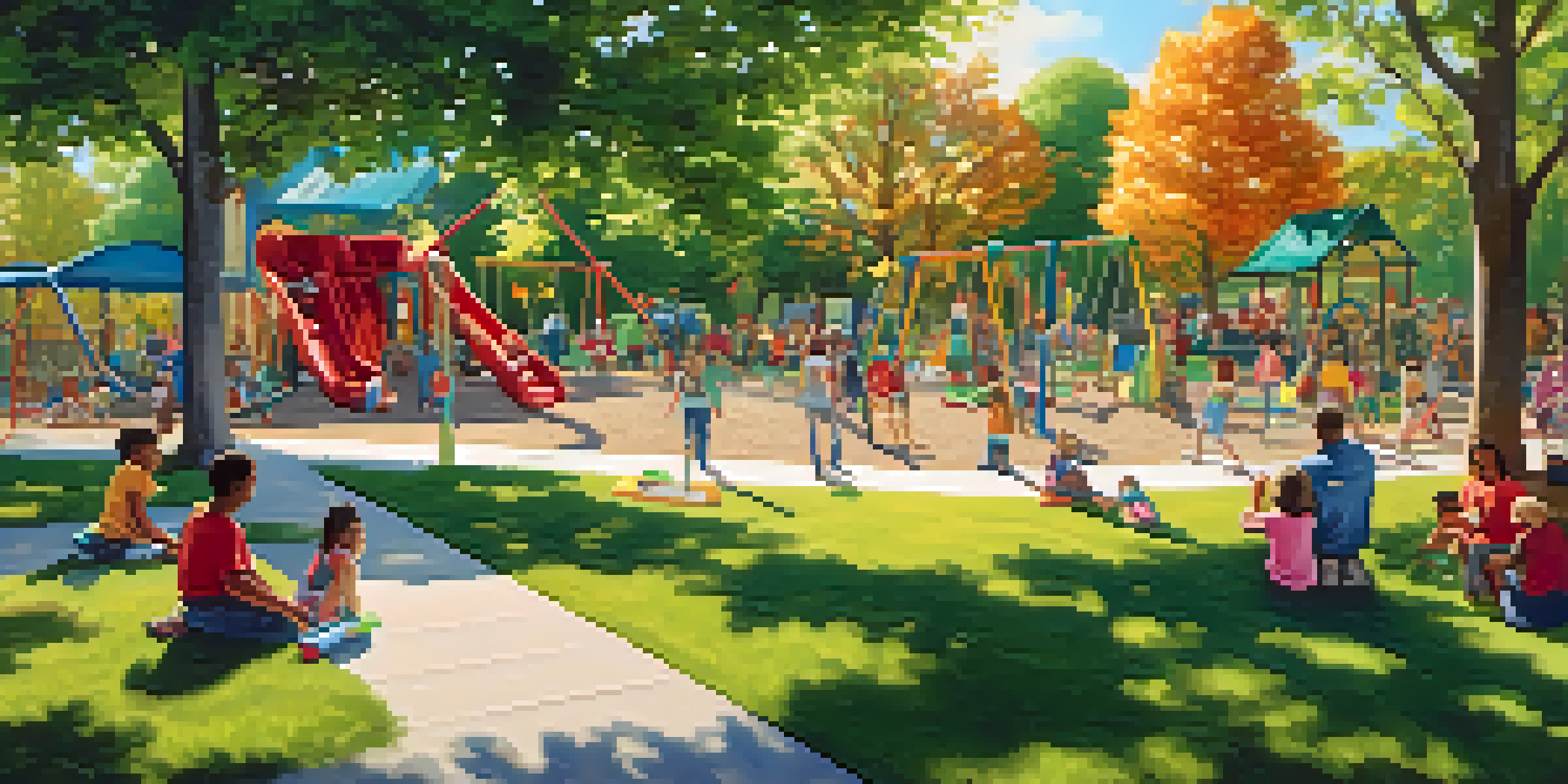Enhancing Child Development through Community Resources

The Importance of Community in Child Development
Community plays a vital role in child development by providing support systems that foster growth. When children are surrounded by a network of caring adults, they feel safe and valued, which encourages exploration and learning. From family members to local mentors, every interaction shapes a child's social and emotional skills.
It takes a village to raise a child.
Moreover, communities often present opportunities for children to engage in various activities, such as sports, arts, and educational programs. These activities not only enhance physical and cognitive abilities but also teach teamwork and perseverance. Such experiences are invaluable as they lay the groundwork for future successes.
Lastly, a strong community can help identify and address developmental concerns early on. Parents and caregivers can work together to share resources, attend workshops, and support one another, ensuring that every child receives the attention they need to thrive.
Leveraging Local Schools for Developmental Support
Local schools are often at the heart of community resources, providing structured environments for learning and development. They offer not just academic education but also social and emotional learning programs that help children navigate their feelings and relationships. This holistic approach is crucial for well-rounded development.

Additionally, schools frequently collaborate with community organizations to provide after-school programs and workshops. These initiatives can help children explore new interests and build skills outside the traditional curriculum, enriching their overall educational experience. Parents can encourage their children to participate in these programs to enhance their learning.
Community Supports Child Growth
A strong community provides essential support systems that foster children's social, emotional, and cognitive development.
Moreover, schools can serve as a hub for resources, connecting families with local services such as counseling and special education support. By fostering strong ties between schools and the community, we create environments where children can flourish both academically and personally.
Engaging with Local Nonprofits for Enrichment
Nonprofit organizations often play an essential role in enhancing child development by offering programs tailored to various needs. These organizations can provide mentorship, tutoring, and even recreational activities, all designed to support children in achieving their potential. Their mission-driven approach ensures that resources are allocated where they are most needed.
Children are not only the future of our country, but also our present. They are our most valuable asset.
Many nonprofits focus on specific populations, such as at-risk youth or children with disabilities, creating targeted interventions that can make a significant difference. For instance, some organizations offer scholarships for extracurricular activities that children might otherwise miss out on due to financial constraints. This inclusivity promotes equal opportunities for all children.
Furthermore, engaging with nonprofits allows families to strengthen community ties. Parents can volunteer, participate in events, and connect with other families, building a network of support that benefits everyone involved. This sense of belonging can greatly enhance children's emotional and social development.
Utilizing Libraries for Educational Growth
Libraries are treasure troves of resources that can significantly enrich a child's learning experience. Beyond books, many libraries offer free programs such as storytelling sessions, workshops, and summer reading challenges that ignite children's imaginations and foster a love for reading. These activities are not just fun; they also enhance literacy and critical thinking skills.
Additionally, libraries often provide access to technology and learning materials that might not be available at home. From computers to educational games, these resources can bridge the gap for families who may be struggling to provide such tools. Encouraging children to utilize library resources can empower them to take charge of their learning.
Schools Enhance Learning Opportunities
Local schools serve as vital resources by offering educational programs and connections to community services that enrich children's experiences.
Moreover, libraries serve as community hubs where families can connect with others, attend events, and participate in discussions. This sense of community encourages children to engage socially and develop essential interpersonal skills that are vital for their future.
The Role of Sports in Child Development
Participating in sports is an excellent way for children to develop physically, emotionally, and socially. Engaging in team sports fosters collaboration and communication, teaching children how to work with others towards a common goal. These experiences build character and resilience, essential traits for success in life.
Moreover, sports help children develop discipline and time management skills as they learn to balance practice, homework, and family time. The physical activity involved also promotes a healthy lifestyle, encouraging children to take care of their bodies. This foundation of health and well-being can lead to lifelong habits.
Additionally, local sports leagues often provide a sense of community and belonging. Children who participate in these activities form friendships and connections with peers, creating a supportive environment that further enhances their development. Parents can play a crucial role by encouraging their children to engage in sports and celebrate their achievements.
Art and Culture: Nurturing Creativity and Expression
Exposure to art and cultural activities is vital for children's creative development. Engaging in art allows children to express themselves, explore their emotions, and develop critical thinking skills. Whether it's painting, music, or theater, these experiences help them communicate ideas and feelings in unique ways.
Community resources often provide access to art classes and cultural events that enrich children's lives. Museums, galleries, and cultural festivals can inspire curiosity and appreciation for diverse perspectives. Parents can encourage exploration by attending these events together, fostering a love for the arts.
Engagement Builds Family Connections
Community programs encourage parental involvement, creating networks that empower families and strengthen the developmental journey for children.
Furthermore, art and culture can serve as powerful tools for social change and awareness. By participating in community art projects or cultural initiatives, children learn about their own identities and the world around them. This understanding promotes empathy and social responsibility, key components of holistic development.
Fostering Parental Involvement through Community Programs
Parental involvement is crucial for a child's development, and community programs can enhance this engagement. Workshops, support groups, and family events provide parents with resources and networks to help them navigate the challenges of raising children. This support fosters a sense of belonging and shared responsibility within the community.
Many community programs offer educational opportunities for parents, covering topics such as child development, positive discipline, and health. By equipping parents with knowledge, these programs empower them to make informed decisions that benefit their children. An informed parent can be a child's strongest advocate.

Moreover, these programs often encourage family participation, allowing parents and children to bond over shared activities. Whether it’s a family picnic or a workshop, these experiences create lasting memories and strengthen family ties. Ultimately, fostering parental involvement through community resources enhances the developmental journey for children.